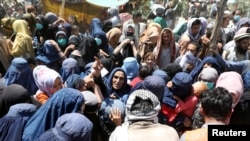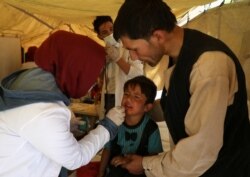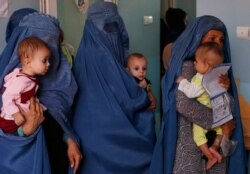A U.N.-sponsored high-level ministerial meeting on Afghanistan next week will seek to raise $606 million to provide life-saving humanitarian assistance for nearly 11 million people until the end of the year.
U.N. Secretary-General Antonio Guterres warns Afghanistan is facing a looming humanitarian catastrophe. The U.N. Chief will travel to Geneva to convene next Monday’s meeting to gain the support of the international community to address the growing needs in the country.
The United Nations reports nearly half of Afghanistan’s population of 38 million needs humanitarian aid. Among them are 3.5 million people internally displaced by conflict.
The U.N. Children’s Fund reports 600,000 children under age five are suffering from severe acute malnutrition, a dangerous condition that could kill them if they do not receive emergency aid.
Spokesman for the U.N. office for the coordination of humanitarian affairs Jens Laerke says the appeal will provide treatment for more than a million children and women suffering from acute malnutrition. He says the appeal also aims to deliver critical food, essential health services, water and sanitation, emergency education, shelter, and other relief.
“Humanitarian organizations have decades of experience in delivering relief in Afghanistan. This year alone, eight million people have received assistance. But basic services in Afghanistan are collapsing and food and other life-saving aid is about to run out," he said.
The World Food Program reports one in three people in Afghanistan is going hungry.
WFP spokesman Tomson Phiri says the humanitarian crisis unfolding in the country will worsen during the fast-approaching winter season. He says WFP is racing to preposition food before the snow cuts off access to large areas of the country.
“In just a few weeks, sadly, our food will run out. We have called for resources, and we are urgently requiring $200 million to assist 14 million people between now and the end of 2021…We need to get timely contributions whilst we still have a window of opportunity to bring in food,” he said.
U.N. agencies vow to remain in Afghanistan and provide humanitarian aid despite increasing insecurity under Taliban rule.
U.N. officials say they have been present in the country for nearly four decades and have experience in working with different authorities, even the Taliban, when the militant group last held power between 1996 and 2001.
The U.N. assures international donors none of their money will end up in government hands. U.N. officials say all money is channeled to implementing agencies on the ground, who will put it to good use.







